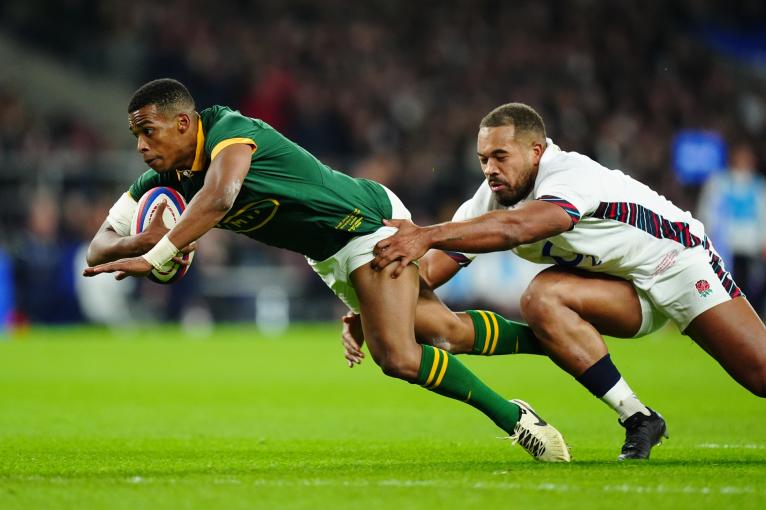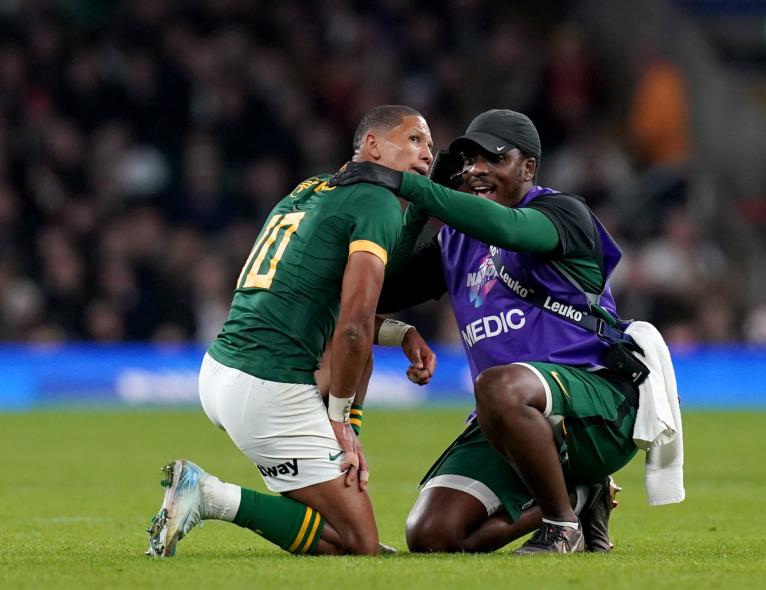This Springboks team still relies largely on vibes
Does the score really reflect how the game went? Rassie Erasmus asked this question after his team claimed yet another scrappy win against a top-tier team. Just like the one-point wins in the World Cup last year, just like the twin victories over New Zealand at home this year, just like the 17-point triumph in Edinburgh last week, the Springboks were second-best for large chunks against England.

And yet they won. Quite comfortably if the score is to be taken at face value. How on earth do they keep doing it?
“Overall I guess when you play at Twickenham, when you say that you’re not happy with the performance but you beat them by nine points, that would be arrogant,” added Erasmus. “We are [happy with the performance]. It wasn’t fantastic. But we contend.”
England back Ollie Sleightholme chats to Ugo Monye about the upcoming clash with the Springboks. Watch the full clip on RugbyPass TV
Watch now
England back Ollie Sleightholme chats to Ugo Monye about the upcoming clash with the Springboks. Watch the full clip on RugbyPass TV
Watch now
What does all this mean? Most obviously it underlines the side’s champion credentials. You don’t claim all that silverware and beat all those teams if you’re not elite. This is a cohort littered with star players. Some are contenders as the best Boks in their position of all time. Clearly something is working. The results don’t lie. And yet there is this nagging feeling that they should be playing better.

This double tug is now common for Springboks fans. The ultra-critical among them will expect more. If this group is to match the all-conquering All Blacks of the previous generation they will need to start putting teams to the sword with more regularity.
But these demanding fans will be among the minority. Winning is winning, and however that is achieved is immaterial. And rather than point to lucky breaks or catching opponents cold, perhaps the lesson here is that the Springboks are a team that relies on moments, rather than sustained dominance throughout matches.
There were seven defining moments that swung it for them here. Four ended in tries. One came just after the hour when Malcolm Marx ducked low to steal the ball as England were mounting pressure. Another, 10 minutes later, came when Luke Cowan-Dickie gave away possession when he accidentally dummied at the line-out throw. Shortly after that, just as England were running out of puff, Lukhanyo Am made a world-class read on defence, hammered Ollie Lawrence and forced a turnover.
Seven moments across 80 minutes. Even their tries were the result of moments. Grant Williams with a jinking solo run. Pieter-Steph du Toit pouncing on a loose ball after charge downs from two consecutive kicks. And Cheslin Kolbe producing magic with his dancing feet, rounding seemingly static men in white jerseys to dot down and confirm his status as the world’s deadliest finisher.

Tony Brown has brought in a new identity on attack. Ball carriers move in a different formation and cleaners now have a different brief. But this feels like the subplots for the main narrative thread. For all their systems, for all their strategies, for all of Erasmus’ clever tinkering and the tethering of the team to the nation, this is a squad that relies largely on vibes.
Both Erasmis and Siya Kolisi spoke of the experience that runs through the group. Steve Borthwick also mentioned it. This is now a team that does not panic when they’re under pressure. In fact, they fully recognise that there will be large periods of the match in which they are third best in a two-horse race. This is not a bug but a feature. It is this acceptance that allows them to remain calm, to remain patient, to recognise that moments will present themselves and that some moments matter more than others.
England bossed the breakdown, just as Scotland did last week. “It took us until minute 55 before we actually got fluent ball,” Erasmus said. That’s almost 70 per cent of the match. Lesser teams, teams with less self-belief, would have capitulated.

It’s why they can sub off Manie Libbok early one week and back him to continue unfurling cross-field assists next time he takes the field. It’s why Handre Pollard enters the field and immediately drills a 50-metre penalty at a moment when the rest of the team started to splinter. It’s why Marx, the world’s best hooker, can have the impact he has off the bench and not throw his toys out the cot for not starting. Please don’t mistake this for the gushing one-eyed praise of a South African. This is an attempt by an observer of the game to quantify what seems to be a recurring, unquantifiable phenomena.
Sure, they lost to Argentina and Ireland this year, but only as a consequence of two late kicks that went against them. They could easily be 11 from 11 and yet have they once, for an entire match, put in a commanding show?
Manie Libbok receives medical attention – PAWhen asked if this group is an improvement on the team that won the World Cup last year, Erasmus was quick to point out that no other coach rotated like he has.
“If you take everything into account, with Wilco [Louw] being the 50th player that has played for us this year, and you look at the actual game time [of all the players in the squad] it’s actually a lot.

“It’s giving Andre [Esterhuizen] proper game time when he wasn’t injured. It’s giving Lukhanyo [Am] game time, getting Canan [Moodie] in the mix, Cobus [Reinach], there are so many guys we’ve given a chance.
“We do know that our rhythm is going to lack. What we try to keep with everybody is the hunger, the grunt, the passion. Sometimes that makes it a good season. I know that if we picked the same team from beginning ’til end, we would have been much smoother during the year. But we’re happy with the results.”
Dominance without fluidity. What will they be once things actually start to click and they don’t solely rely on moments and vibes?
Women’s Rugby World Cup England 2025 tickets application phase is now open! Apply now.









































